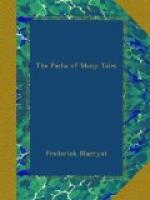“Calm yourself, my dear madam,” replied I: “the proofs you have not yet seen. First be satisfied, and then indulge in your delightful anticipation. When I pressed Don Pedro upon the subject of his family, I told him candidly that his only chance of success was unlimited confidence: he acknowledged that he had been sent to the Asylum when an infant, and that he did not know his parents; that the mystery and consequent stigma on his birth had been a source of mortification to him through life. I asked him if he knew his age, or had a copy of the register of his reception. He took it out of a small cabinet; it was on the 18th of February, in the same year that your child was sent there. Still as I was not sure, I stated that I would call upon him this morning, and see what could be done; assuring him that his candid avowal had created strong interest in his favour. This morning I repaired to the Asylum, when I examined the register. Two children were brought in on that night: here is the extract, and I feel much mortified, as you will observe, that no marks are mentioned. If, therefore, the wart you spoke of was not still remaining, the uncertainty would have been as great as ever. When I returned to him about an hour since, I renewed the subject, and stated that I thought it was the custom to make a note of any particular marks upon the children, by which they might be eventually reclaimed. He replied that it was customary when they were indelible, but not otherwise: that he had no indelible mark, although a large wart had been on the back of his neck as long as he could remember; ‘but,’ added he, ’it is of no use,—all hopes of finding my parents have long since been abandoned, and I must submit to my unfortunate destiny. I have thought upon what has passed, and I feel that I have acted wrong. Without family and without name, what right have I to aspire to the hand of any young lady of good parentage? I have made the resolution to conquer my feelings; and before the intimacy has been carried on to an extent that a rupture would occasion any pangs to her that I adore, I will retire from Seville, and lament in solitude my unfortunate condition.’
“‘Are you capable of making such a sacrifice, Don Pedro?’ said I.—’I am, Father Anselmo,’ replied he: ’I will always act as a man of honour and of family, although I cannot prove my descent.’
“‘Then,’ said I, ’Don Pedro, do me the favour to call upon me this evening at my convent, and I hope to have some pleasing intelligence to impart.’ I then left him, to come here and acquaint you with the joyful discovery.”—“But why did you not bring him here immediately?” cried Donna Celia.




